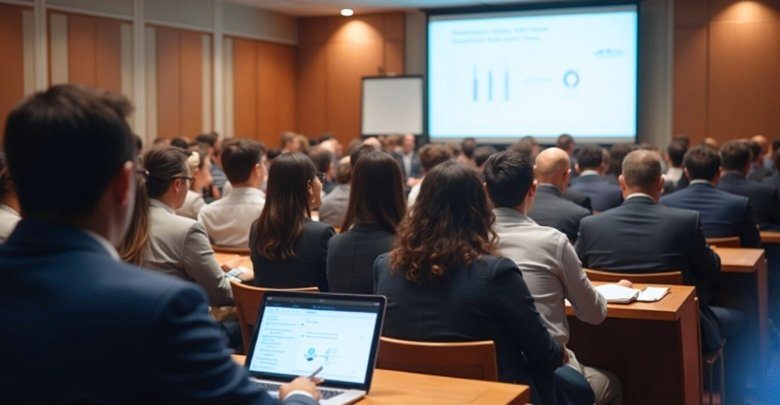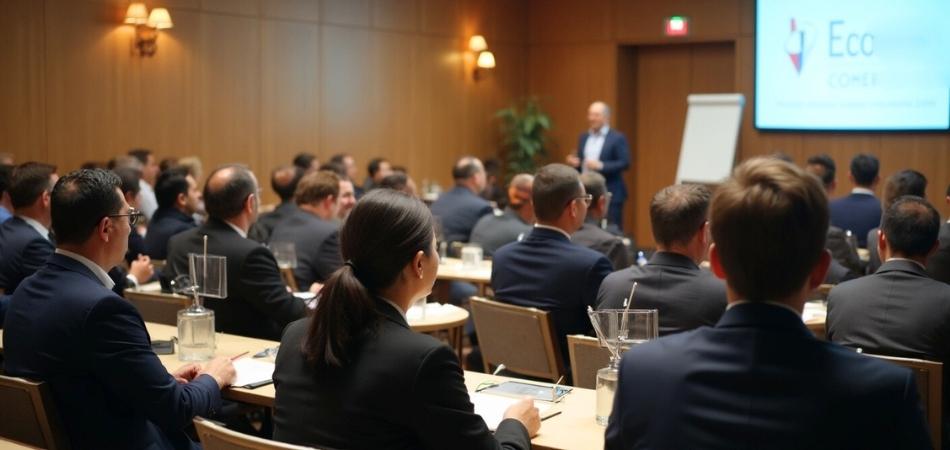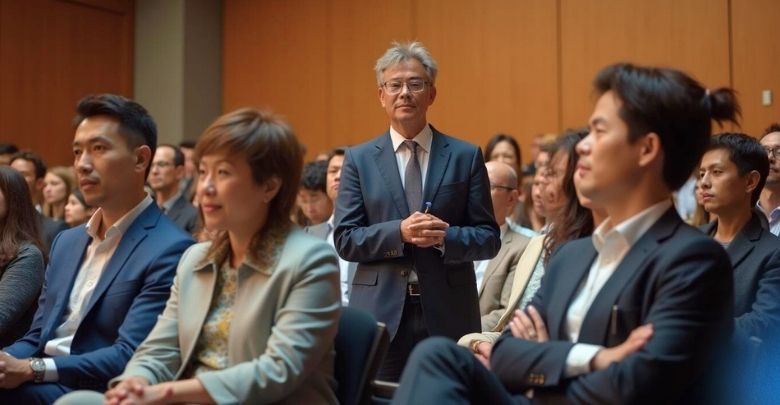It can be very beneficial to attend an economics conference to gain insight into the most recent trends, research, and to establish professional connections. For many interested individuals, the question arises: Can I Attend an Economics Conference Without Submitting a Paper?
The answer is positive. Several conferences welcome attendees who want to participate without presenting their research. By registering as an attendee, you gain access to networking opportunities, informative sessions, and engaging discussions, all without the pressure of paper submission.
This flexibility makes conferences more accessible, allowing you to deepen your knowledge and expand your professional network at your own pace. Read on to learn about the benefits, tips for making the most of your conference experience, and how to select the right conference for your goals.
Significance of Attending an International Economics Conference
International economics conferences offer great opportunities for individuals interested in the field. Participants can gain insights into global economic issues while learning from experts in various disciplines. Engaging with diverse viewpoints allows attendees to better understand complex topics and emerging trends.

These conferences offer a wealth of networking opportunities that will enable you to connect with professionals from different fields. Building relationships can lead to collaborations and future research opportunities. Additionally, discussions with peers and experts can inspire new ideas and solutions for economic challenges.
For those interested in expanding their knowledge internationally, the upcoming international economics conference in Canada is an excellent opportunity. Attending such events can help you stay informed about current trends and developments in economics. Embracing these experiences can positively impact your career and broaden your understanding of the global economy.
Can I Attend an Economics Conference without Submitting a Paper?
Yes, you can attend an economics conference without submitting a paper. Many conferences welcome participants who want to join as attendees. This allows you to enjoy the benefits of the event without the pressure of presenting.

Attending these conferences provides a chance to learn from experts in the field. You can listen to presentations, participate in discussions, and ask questions. Engaging with different ideas helps broaden your understanding of various economic topics.
Networking is another important aspect of attending conferences. You can meet professionals, researchers, and students who share your interests. Building connections can lead to future collaborations or even job opportunities in economics.
If you are interested in gaining knowledge, attending is a great choice. Upcoming international economics conferences offer many opportunities to engage with the latest research. Participating in these events enriches your experience and boosts your professional growth in economics.
Who Benefits Mostly by Attending an Economics Conference?
Various groups of people can benefit from attending an economics conference. These events offer unique opportunities for learning, networking, and professional development. Understanding who benefits most can help potential attendees decide to participate.
Students and Early Career Professionals

Academics and Researchers
Academics benefit by sharing their research with peers. Presenting findings allows for feedback and constructive criticism. These interactions often spark new ideas and collaborations. Conferences can also enhance their visibility in the academic community.
Industry Professionals
Professionals in the industry gain insights into real-world applications of economic theories. They learn about innovative practices and trends affecting their fields. Networking can lead to partnerships or consulting opportunities. Industry engagement with researchers fosters practical solutions to economic challenges.
Policymakers and Government Officials
Policymakers can gather evidence and insights to inform their decisions. Conferences provide a platform to discuss pressing economic issues. Engaging with researchers helps bridge the gap between theory and practice. Access to diverse perspectives aids in creating effective policies.
Business Leaders and Entrepreneurs
Business leaders benefit from understanding economic trends that affect their companies. They can explore new markets and innovative strategies through discussions. Networking with academics and researchers can inspire new business ideas. Overall, they can raise their competitive edge in the market.
The event provides value to the ideal attendees for international economics conferences such as business leaders, entrepreneurs, and startups. Each group can utilize the experience to raise their professional and academic journeys.
What Are the Typical Requirements for Attendance?
Attending an economics conference requires meeting certain requirements to ensure a smooth experience. These criteria help organizers manage the event and provide valuable opportunities for participants. Here are the typical requirements for attendance at such conferences.
- Registration: Most conferences require participants to register in advance. This helps organizers plan for the number of attendees and allocate resources.
- Payment of Fees: A registration fee is usually required to attend. This fee covers conference materials, meals, and other logistical costs.
- Submission of Abstracts: Some conferences ask for a submission of an abstract if you wish to present. This allows organizers to evaluate the quality and relevance of proposed presentations.
- Affiliation Information: Attendees are often required to provide information about their affiliations. This helps establish the professional background of participants.
- Travel Arrangements: Participants need to arrange their own travel to the conference location. This includes booking flights, accommodations, and local transportation.
- Visa Requirements: International attendees may need to secure a visa before attending. This involves preparing necessary documentation and submitting applications in advance.
- Conference Guidelines: Participants must follow specific guidelines set by the conference organizers. These often include codes of conduct and presentation formats.
- Networking Etiquette: Being respectful and professional during networking sessions is important. Attendees should be prepared to engage and make meaningful connections.
Write an Economics Research Paper – What Are the Steps?
Writing an economics research paper involves a structured approach to ensure clarity and effectiveness. A well-organized paper communicates findings and contributes to the academic community. Here’s a step guide to help you through the process:
Step 1: Identify a Research Question
Select a specific question that addresses a gap in existing literature. This question will guide your research and analysis. Ensure it is relevant to current economic issues and interests. A clear focus will make your research more impactful.
Step 2: Conduct a Literature Review
Review existing research related to your question to understand the current state of knowledge. This step helps identify gaps and informs your methodology. Summarizing key findings can provide context for your own research. It also strengthens the foundation of your paper.
Step 3: Develop a Methodology
Outline the methods you will use to collect and analyze data. This could involve quantitative, qualitative, or mixed methods approaches. Clearly explaining your methodology helps readers understand how you reached your conclusions. Transparency is crucial for validating your results.
Step 4: Collect Data
Gather relevant data to support your research question. This may involve surveys, experiments, or secondary data sources. Ensure your data collection methods are ethical and systematic. Quality data is essential for robust analysis.
Step 5: Analyze the Data
Once data is collected, analyze it using appropriate statistical techniques. Look for patterns, trends, and relationships that address your research question. Interpret your findings in relation to existing literature to highlight their significance. Clear presentation of results enhances understanding.
Step 6: Write and Revise
Draft your research paper, ensuring it has a clear structure with an introduction, body, and conclusion. Revise your work for clarity, coherence, and grammatical accuracy. Consider feedback from peers to improve the quality of your paper.
These steps to write a conference paper in economics guide you to a compelling and impactful research paper. Following this structured approach will enhance the quality and impact of your research.
Tips for Engaging with Speakers and Presenters
Engaging with speakers and presenters at conferences can enhance your experience significantly. Building connections with experts can lead to valuable insights and opportunities. Here are some tips to help you interact effectively with them.
- Prepare Thoughtful Questions: Before the session, prepare questions related to the topic. Thoughtful questions demonstrate your interest and encourage meaningful dialogue.
- Introduce Yourself Early: Approach the speaker after their presentation to introduce yourself. A brief introduction helps establish rapport and makes future interactions easier.
- Listen Actively: Pay close attention during presentations to understand the content better. Active listening allows you to ask informed questions later.
- Be Respectful of Their Time: Recognize that speakers often have busy schedules after their presentations. Keep conversations concise and focused to show appreciation for their time.
- Follow Up After the Event: Send a thank-you email after the conference to express your appreciation. Mention specific points from the conversation to reinforce the connection.
- Engage on Social Media: Connect with speakers on platforms like Twitter or LinkedIn. Engaging with their content can help maintain the relationship and facilitate future interactions.
- Attend Networking Events: Participate in networking sessions where speakers might be present. These casual settings encourage more relaxed conversations and deeper connections.
FAQs About
Participating in an economics conference without presenting a paper can still be incredibly rewarding. Here are answers to some frequently asked questions on how to maximize your experience, including benefits, logistics, and ways to engage fully as an attendee. Whether you’re attending to learn, network, or explore research trends, these FAQs will help you make the most out of your conference participation.
Do I Need an Academic Affiliation to Attend?
No, an academic affiliation isn’t always necessary to attend an economics conference. Many conferences are open to all interested attendees, including students, professionals, and independent researchers. Check the event’s registration requirements for specific details.
How Can I Register as An Attendee?
You can typically register through the conference website by selecting the “attendee” or “non-presenting participant” option. The process usually involves completing a form and paying a registration fee, which secures your access to sessions and events.
Are There Specific Networking Opportunities for Attendees?
Yes, conferences often have networking sessions designed for all participants. Attendees can engage in roundtables, group discussions, or social events. Some events may even have designated networking areas or activities, enhancing opportunities for meaningful connections.
Will I Receive a Certificate for Attending?
Many conferences provide certificates of participation for attendees. This certificate can be useful for students or professionals who wish to document their involvement in professional development activities, so be sure to inquire if this is important to you.
How Can I Stay in Touch with Contacts After the Conference?
To maintain connections, follow up via email or social media shortly after the event. Engaging through LinkedIn or Twitter is often effective for professionals, and some conferences even offer online communities where attendees can keep the conversation going.
Bottom Line
The option of attending an economics conference without submitting a paper is not only possible but also beneficial. Many conferences encourage participants to register as attendees, allowing them to engage in discussions and network effectively. The question, “Can I Attend an Economics Conference Without Submitting a Paper?” is addressed with a clear yes, as these events provide valuable learning opportunities for everyone involved. Besides that, networking with professionals, researchers, and students can lead to collaborations and career advancements.
Overall, participating in these conferences improves your knowledge of economics and helps you stay updated on current trends and research. Embracing these experiences is essential for both personal and professional growth in the field.





